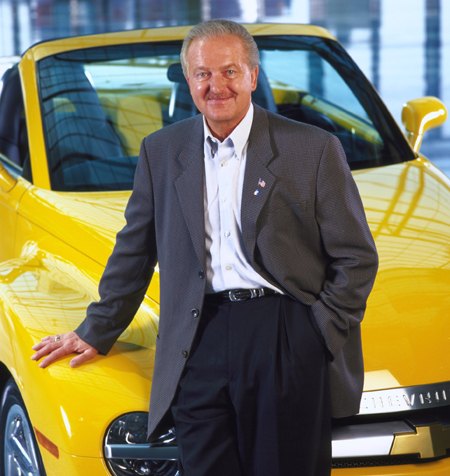General Motors Death Watch 104: TMI?
Gary Cowger recently sat down with Wards Automotive for a good old kvetch. GM’s group Vice President of Global Manufacturing and Labor Relations complained that news of his employer's financial woes was overshadowing their brilliant new products. Gary blamed excessive media coverage and speculation. “There’s a lot of noise in the system, and that’s because we live in an age of transparency like the world has never seen before… It’s almost too much information out there.” As you might expect from such a staunch defender of bridled free speech, Cowger has taken steps to rectify the situation– at least in-house.
In 1999, Cowger installed a “communicator” in every GM plant and office. He's charged these management mouthpieces with explaining GM's hopes, dreams and schemes to their co-workers. Gary’s convinced that his network of [dis]information specialists has already delivered big dividends. “I think the open communication with people at all levels helped facilitate our ultimate health-care deal, because everyone was convinced there was a problem and everyone was willing to work to solve it.”
At the risk of bringing the noise, note Gary’s unintended irony. Deploying a bunch of company stooges "communicators" to “convince” employees to rubber stamp a bogus health care deal window-dressed by both management and the UAW doesn’t sound like the definition of “open communication” to me. Yes, but– you gotta give Gary credit for holding his nose and dipping his e-toes into the “new media.” His department now conducts regular on-line chats with 40 GM employees from around the world.
Cowger proudly asserts that participants in his electronic confabs aren’t required to reveal their identity– at least not to each other. (Cowger selects the group.) Gary assured Wards that these “what’s up with that?” cyber chats stimulate the proverbial frank and open exchange of ideas. “They will tell you honestly and in volumes what we should be doing,” Cowger revealed. “I think it’s great for not only cutting through the clutter and getting to the heart of things, but it’s a way of building a better GM.”
A better GM. If only. In all probability, Gary’s electronic forums do nothing more than give a small group of inherently disgruntled employees a chance to blow off some steam– and raise expectations that won’t be fulfilled. Although Wards didn’t press him on this (or any other) issue, can Mr. Cowger point to a single important change in GM’s process or products that stems from his twisted take on electronic Glasnost?
While I have no doubt that ramming a faux health care concession down employees’ throats constitutes a victory of some sort ($3b health care VEBA anyone?), the methodology involved indicates that GM’s culture of paranoia, unaccountability and corporate constipation continues unabated.
In fact, I reckon nothing significant has changed over at RenCen since we began this chronicle of GM’s declining fortunes. Factories are closed. Departing workers have been paid off. Output has declined. New products have been launched. And? GM is still staggering around under the weight of the same old stodgy leadership, cannibalistic dealers, obstreperous unions, half-baked products, marketing misfires, "not an incentive really" fire-sales, Bacchinalian auto shows (how much is that Carmen in the window?), backdraft cash burn, etc.
These days, the company talks-up global platform development as The Big Change. But GM NA still consists of eight increasingly nonsensical brands– and their attendant fiefdoms– all fighting for corporate resources. The fact that they’re going to do it on an international basis isn’t a game changer. Saturn now sells an Opel-derived car alongside a rebadged Pontiac. So?
According to turnaround specialist Gregory Charleston, any business experiencing a rapid, seemingly endless decline in its market share must make radical changes. The Managing Director of Conway MacKenzie & Dunleavy says that companies facing flagging income must cut deep, across the board. While big old companies like GM are reluctant to prune their pals in middle management, prune they must.
“If you have to do things in a new way, you need new people– or less people– to do it.” So how’s that particular part of the program going over at GM? “My sense is that there’s still a LOT of room there.”
Charleston’s focus on GM’s stultified middle management reflects his belief in the overriding importance of corporate culture. Charleston says members of GM’s entrenched bureaucracy should be pushed out the door, and fresh blood brought in. So where does that leave CEO Rick Wagoner, a man who never worked a day of his life outside GM?
“I’m always leery of corporate executives who grew up within an organization… Can Wagoner turn around GM’s corporate culture when he’s known nothing else? I imagine that’s a question that GM’s Board of Directors has been grappling with for years.”
Or not. Maybe Gary Cowger should recruit a random sampling of blue and white collar workers and put them online with GM’s Board of Bystanders. They could discuss Rabid Rick’s ability to lead a cultural revolution within GM. Or would that be too much information?
More by Robert Farago
Latest Car Reviews
Read moreLatest Product Reviews
Read moreRecent Comments
- Redapple2 Someone else said it. Looks like a 4/5 size ford edge (front and back)
- Rochester Tim, where was your head at in 1984 when it became a law to wear your seatbelt? Personally I thought it was none of the Gubmint's bizniss to force me to belt up. Today, I feel exposed and unsafe without it. My point is, give it time, both the tech and your values will evolve.
- Theflyersfan After looking it over, Honda, I want royalties for this one: The Honda Yawn.
- V8fairy Not scared, but I would be reluctant to put my trust in it. The technology is just not quite there yet
- V8fairy Headlights that switch on/off with the ignition - similar to the requirement that Sweden has- lights must run any time the car is on.Definitely knobs and buttons, touchscreens should only be for navigation and phone mirroring and configuration of non essential items like stereo balance/ fade etc>Bagpipes for following too close.A following distance warning system - I'd be happy to see made mandatory. And bagpipes would be a good choice for this, so hard to put up with!ABS probably should be a mandatory requirementI personally would like to have blind spot monitoring, although should absolutely NOT be mandatory. Is there a blind spot monitoring kit that could be rerofitted to a 1980 Cadillac?

































Comments
Join the conversation
Ar-Pharazon, I encourage you to look at the final Top 10 TWAT list, and pick out one vehicle that fits the needs of it's market or class extremely well. Pick out just ONE vehicle on the TWAT list that you feel is undeserving. I dare you. You can argue about this all day long, but the Camry did not deserve to be on the TWAT list because it is class leading, and an extremely competitive vehicle that fits the needs of the midsize market all too well. Even if you read a survey yesterday, that compared current domestic cars and current imports, the bar is already moving. Most articles and posts related to the American automakers improving talks about the future, not the present. Yes, at present, American automakers have improved a great deal over the past several years, but they still have a long way to go. And I'm not particularly focusing on any surveys. I, along with others, such as the staff at TTAC, look at the present, as well as the future. We look at the cold, hard facts. We look straight through the media, the bias, and all the silly playground arguments occuring on the internet. I have extensive knowledge on the corporate culture of each of the world's major automakers. I will also say that Robert Farago, and some of the other TTAC writers possess similar knowledge. I stand by what I said, which is despite the current and upcoming future improvements of American automakers, import automakers are too improving currently, as well as looking to improve themselves in the future. Seems that you in fact are the one that is diverting oneself from the facts. As much as it no doubt pains some of you here, Toyota is in a very envious position right now, and although they are certainly not perfect, they are doing a lot of things right now extremely well. Same can be said for Honda. Yes, the domestics have improved in many areas, and in a few areas have surprised import makers, depending on which survey you look at. But again, that has nothing to do with the fact that Honda and Toyota, the bulk of the import competition, are a moving target. Toyota and Honda both have publicly stated that they will increase quality to new levels, and Toyota wants to increase the quality gap between it's competitors, even with American automakers improving their quality. In case you're still confused, Toyota wants to increase it's quality at a faster rate than any of it's competitors. This is of big concern to the competition, and should be a concern to any import critics. Recently, when Toyota's CEO Watanabe held a press conference to state Toyota's 2007 sales goals, instead of talking mostly about sales and becoming #1 worldwide in terms of sales, he spent the majority of the press conference talking about his concern about Toyota's quality control, and he reiterated that increasing quality is Toyota's top priority. If that's not paranoia, I don't know what is. A press conference, from an extremely successful company, meant for a discussion of sales goals for next year, ends up being about the CEO's concern for the company and how the company vows to increase and improve quality at every level. You would be forgiven for thinking that Toyota was in a big crisis, based on the attitude that Watanabe has. You would also be forgiven for thinking that GM is doing extremely well in the marketplace, given the attitude of Wagoner and Lutz. Heck, if one were to believe what Lutz says, than GM is doing extremely well, and has no major problems to speak of.